50 Years of Junior League Cookbooks
A history of Houston women, told through recipes

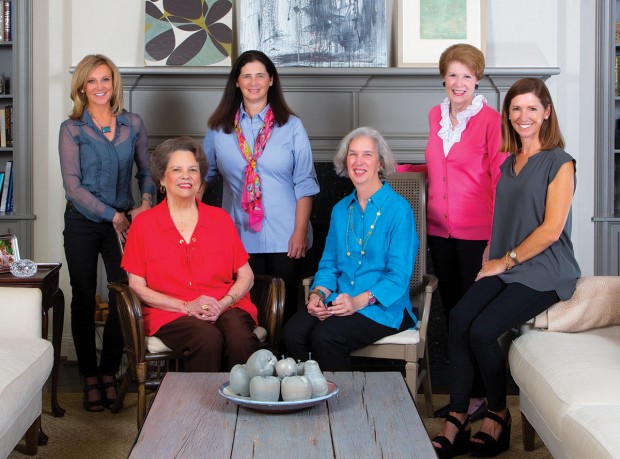
COOKS AND COLLABORATORS Dena Prasher, Alafair Kane, Roni Atnipp, Anne Tucker, Peggy Roe and Leslie Wade (from left) represent four generations of the Junior League of Houston cookbook volunteers. (Photo: lawellphoto.com)
Since 1968, Junior League of Houston cookbooks have inspired countless home cooks. Often handed down generationally, from mother to son or daughter, with notes scribbled in margins and spills on time-worn pages, the books are much more than mere mélanges of recipes. They’re the products of hundreds of hours of work – all volunteer – and glimpses into the ever-changing ways we eat and entertain.
“I inherited [Houston Junior League Cookbook] from my mother, who was not a member of the League, nor am I,” says Margery Anderson, a retired nurse. “Still, I know so many people who have this book. It was our guide to graciousness and good taste, even though the recipes are very down to earth.”
Houston Junior League Cookbook was the League’s first publication in 1968. After that came The Star of Texas Cookbook in 1983, Stop and Smell the Rosemary in 1996 and Peace Meals in 2008.
All the books celebrate good food while benefiting the Houston community. In 2018-19, the Junior League of Houston will contribute approximately $2 million in volunteer time and financial support to our community. Cookbook sales account for part of that.
This year marks the 50th anniversary of Houston Junior League Cookbook and the 10th of Peace Meals. In celebration of the philanthropic and cultural influences of all four Junior League of Houston cookbooks, we are taking a look back at the generations of women who produced them, and what it took to create these historical records of food, family and friends.
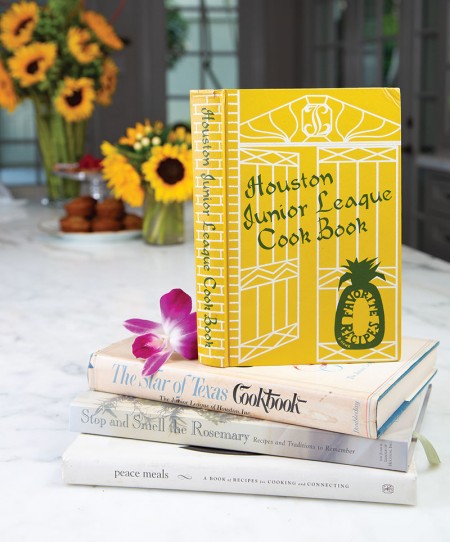
The Houston Junior League Cookbook celebrates its 50th anniversary this year as the original “guide to graciousness and good taste,” as reader Margery Anderson describes it. (Photo: lawellphoto.com)
Houston Junior League Cookbook
Though Houston Junior League Cookbook was published in 1968, it remains a first, and a classic. “It’s my go-to cookbook for anything,” says George Craig, whose mother Alice Craig – or Mrs. Douglas S. Craig, as she’s listed in the book – served on the first cookbook committee. Alice just recently passed away, but George says she loved cooking. “Growing up,” he says, “she found her love of cooking from her mother’s housekeepers. Then I learned to cook from my mom.”
Alice, along with a team of volunteers, home-tested each recipe submitted to the book by League members.
“I was part of the testing process, because when I was at UT, I’d come home and she’d say, ‘Well, we’ve got this to try and this to try,’” George says. “My favorite was the Crab Imperial. And my mother’s Peach Ice Cream was one of her favorites.”
Alafair Kane, listed in the book as Mrs. George V. Kane, Jr., fondly remembers serving on the committee. “I remember being a busy gal cooking. And I loved it, I might add,” she says. “I had a growing family with three young children. While it was the practical thing to try to test recipes they would like – rice dishes and desserts – I did test some recipes they did not enjoy. Sometimes my children would see me in the kitchen working away and they’d say, ‘Not another Junior League recipe!’”
Alafair fondly remembers cookbook meetings. “We’d cook and bring things to the meetings to taste, and to hear everyone’s comments was quite humorous.”
The book took several years to make, as recipes were all handwritten or typed. “We took our time because we wanted to be sure everything was highly approved. And we were all pleased with the way it turned out.”
Anne Tucker, a former League president who married just as the book was released, calls it “the bible of how we learned to cook.” Her mother was a League member as the book was being produced, and many of her friends had contributed recipes. “There was a wave of weddings then, and this was the standard gift for a whole generation of us,” she says. “Thank goodness for this book! It presumes no knowledge on your part, but not in an offensive way.” Anne says that having cooks’ names below each recipe makes it more personal than its successors. “It was special because you knew the person who made it and maybe you’d eaten it in their house.
“I know that now nobody would get a can of tomato soup to baste with, but we did,” Anne says. “It’s old-style, and it has an economy of cost that the newer books don’t because they assume you can buy a lot of spices or an heirloom tomato.”
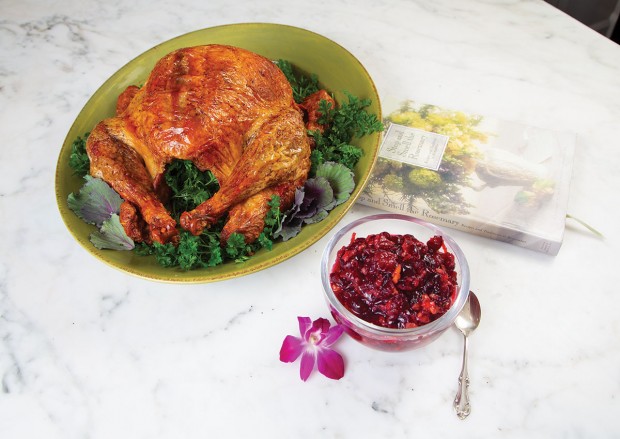
Stop and Smell the Rosemary chair Roni Atnipp says the Citrus Cranberry Relish is so good that everyone will want leftovers. Special thanks to the Junior League of Houston for providing a beautiful turkey for this photo shoot. (Photo: lawellphoto.com)
The Star of Texas Cookbook
After she was married for a while – and she had learned to cook – Anne found herself on the board of the League while The Star of Texas Cookbook, published in 1983, was being produced. “The first book was published by the League, not an outside publisher,” she says. “We just did it.” But for the new book, they hired Doubleday, which brought a level of sophistication.
“The presumption was that we would include names with recipes again, but Doubleday said no. That was a discussion highly fraught with great unhappiness,” Anne remembers. “We would have board meetings to talk about these things from 9 until 2:30, and the only reason they ended was because we had to go to carpool. We had lots of time to be fraught.”
Betty Cochran, chair of the new book, says it took almost six years to put together. “It was before computers,” she says. “We had meetings constantly Monday through Friday and sometimes on Sunday.” But that was a good thing, she says. “The first book was such a success that we had thousands and thousands of recipes submitted. They had hundreds.”
Betty, an accomplished cook, remembers home cooks hosting seated dinners and cocktail parties as recipe testing grounds. “They were more formal affairs [than more recent testing parties],” she says. The long production process didn’t daunt Betty. “The only thing that became problematic was the amount of space it took,” she says. “We bought a bigger house, and everything grew and grew. My children would say, ‘What is all this stuff?’ They knew it was Junior League.”
Peggy Roe was one of many volunteers who tested recipes for The Star of Texas. “I still had kids at home, and one morning I was making four biscuit recipes,” Peggy, now a nonprofit consultant, says. “I made the kids sit at the table until they had tried all of them.
“That book was a really big part of our lives,” she says. “Some of us gained a lot of weight that year! We talked about it and about our recipes. And we knew then who submitted the recipes, so we could look at them and say, ‘Ohhhh…’
“I loved the idea that a bunch of housewives could create a cookbook that would sell and make money for charity.”
“The first book wasn’t conceived as a national effort,” Anne says, “but this one was, and it won all kinds of awards. The best ones were Denver’s and ours. But don’t get me wrong, Baton Rouge was no slouch.”
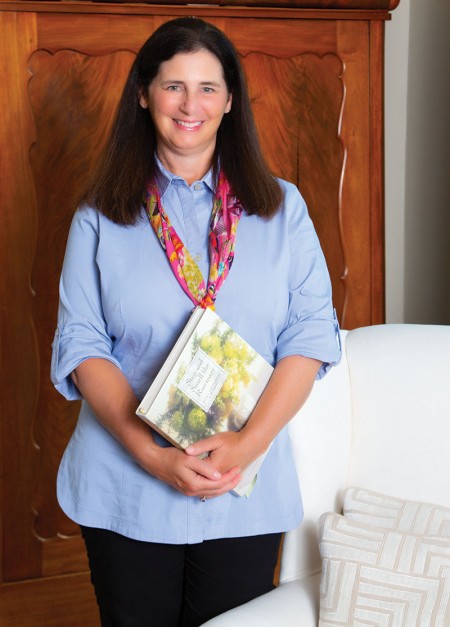
Roni Atnipp was chair of the Junior League of Houston’s Stop and Smell the Rosemary cookbook committee (Photo: lawellphoto.com)
Stop and Smell the Rosemary
Roni Atnipp, chair of the 1996 Stop and Smell the Rosemary, says, “Every generation of League members wants to do their own book. And you get that, because things change and the way we eat changes.”
Roni, who used her experience at the League to launch a publishing consulting business, says the League’s board initially approached her to create a new cookbook, similar to the ones before. “I was like, ‘Huh, I wonder if we can do something else.’ At that point, 1994, there were only two leagues that had done big, beautiful cookbooks – Jackson, Miss., and the Junior League of St. Louis. That was it.
“So I called the chairmen of these books in the other Junior Leagues to learn about their projects, and I went to our board and made a little proposal to do a big, beautiful book, and they were like, ‘Alright, you want to do it, let’s do it.’ So I put together an amazing group of women who were really smart and super talented and had amazing taste. Every day we came up with the next step, and the next step, and the next step.”
Roni’s group launched an underwriting campaign and a recipe campaign. “We worked hard to do it right,” she says. “We tested and tested and tried. When we had too many tortilla soups, we had a tortilla soup cook-off.”
Stop and Smell the Rosemary’s original print run was 85,000, and they sold out in 10 months. “It was new and different and interesting,” Roni says. “Nobody else had done what we had done. These were the most talented women – three or four hundred volunteers – who worked hours and hours and hours, and it was really fun.”
Roni’s committee conceived a new version of “tasting parties,” where volunteers would make recipes and set them on a buffet at a party, and everyone there would sample them. “You wanted to come to a tasting party, you wanted to try a dish,” she says. “We had them in beautiful homes, and this group of girls would stay after and compile the data and what people liked and didn't like. Then we would have another tasting party to get to the best recipe.”
Recipes came in handwritten, on note cards, on scraps of paper. “We took so much time to make sure all of them were written correctly. But at least in 1995 we had computers!”
How did such a huge project affect her family? “It was total chaos in my world,” Roni says. “I had three children then [now she has four]. I was juggling a lot, but that's what Junior League volunteers do. We multitask to the nth degree. We stay up late, get up early, drag our kids around.
One of Roni’s favorite Stop and Smell the Rosemary recipes is Citrus Cranberry Relish. “It is literally the easiest, most delicious recipe for Thanksgiving,” she says. “I always double it because we want to eat it for a week after. I’m talking super easy and really, really good.”
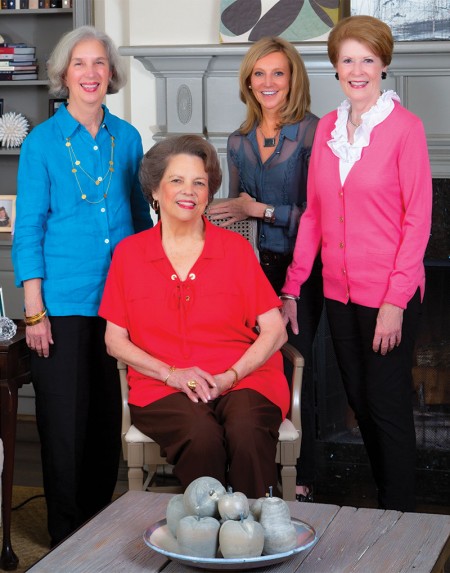
Anne Tucker, Alafair Kane, Dena Prasher and Peggy Roe are Junior League of Houston volunteers who helped create the popular, charity cookbooks (Photo: lawellphoto.com)
Peace Meals
“I got called in and asked if I was interested in doing a cookbook and if I would put together a business analysis of a new book,” says Dena Prasher, chair of Peace Meals, published in 2008. “I had no idea how to do that. But I was interested, and I thought I could just sit down and figure it out.
“They did not ask me because I was a cook,” she says. “They asked me because I love projects, I love collaboration, I love creativity. So one of the first things I did was call Roni. She told me there would be times I would be hiding in my closet on the phone because my family would be so tired of me being on the phone. And she was right.
“It was a three-year commitment, all-consuming, and it was way more than 40 hours a week. I dragged my girls with me everywhere for tastings and photo shoots. It was a big part of all of our lives, not just mine. I changed clothes in the car a lot.”
Dena has since returned to a career in marketing, and she is proud that the book made the best use of her committee’s different strengths and talents. “We edited and edited and edited, because we shared the goal that if we had put so much into it, it darn well better be perfect.”
To begin, every potential Peace Meals recipe was given to two home cook volunteers. Most were submitted online; testers did not know whose recipe they were testing. Based on testers’ input, recipes went on (or didn’t) to tasting parties. “After the rounds and rounds of testing, the [cookbook] executive team made every single recipe in the book, just to make sure we hadn’t made an error in ingredients or cooking times or anything like that.”
Dena says her team worked to produce the best cookbook possible, not the best Junior League cookbook possible. “We wanted to brand and market it as Peace Meals, a great cookbook that happened to be created by Junior League volunteers.”
Dena often hears from people who say they make certain recipes from Peace Meals over and over. “I love the Blueberry Pine Nut Coffee Cake,” she says. “I make it all the time for morning-after hostess gifts, and I bring it to the office. Usually people come to me and say, ‘I hate you! I ate the whole cake!’ I still make a lot of them.”
Was she pleased with the result of three years and hundreds of volunteers’ work? “There’s nothing I would do differently. Except make the type bigger! Ten years ago when people would say they wanted bigger type, I’d say, ‘What are you talking about?’ Now I get it.”
To order a special anniversary bundle, including “Houston Junior League Cookbook” and “Peace Meals,” along with a tote bag and a Texas-shaped bamboo cutting board, go to jlh.org; click on Support and then Books. Proceeds benefit the League’s community projects.
Junior League favorites
Want more buzz like this? Sign up for our Morning Buzz emails.
To leave a comment, please log in or create an account with The Buzz Magazines, Disqus, Facebook, or Twitter. Or you may post as a guest.


